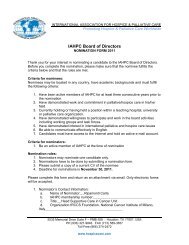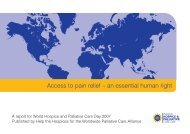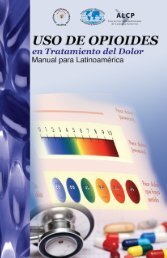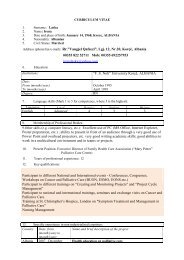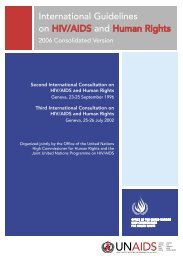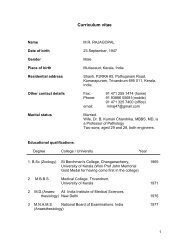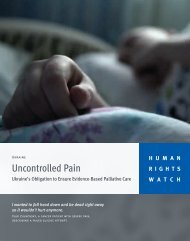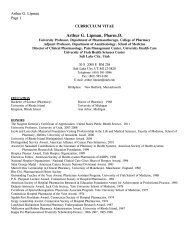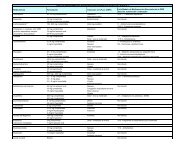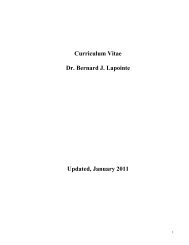INTERIGHTS Bulletin
INTERIGHTS Bulletin
INTERIGHTS Bulletin
You also want an ePaper? Increase the reach of your titles
YUMPU automatically turns print PDFs into web optimized ePapers that Google loves.
192<br />
<strong>INTERIGHTS</strong> <strong>Bulletin</strong><br />
Volume 16 Number 4 2011<br />
refrained from seeking treatment at<br />
public hospitals for fear that their drug<br />
use (past or current) would be shared<br />
with police. This fear is not<br />
unfounded. Public hospitals and drug<br />
treatment centres collect and share<br />
information about individuals’ drug<br />
use with law enforcement, both as a<br />
matter of policy and in practice.<br />
Drug User Registries<br />
Once they come to the attention of<br />
health services, drug users in many<br />
countries are added to ‘registries’<br />
where their status as a drug user may<br />
be made known to others. Drug user<br />
registration serves as a form of state<br />
control over people who are dependent<br />
on drugs and imposes restrictions on<br />
their rights. The process brands people<br />
as drug users for years, sometimes<br />
indefinitely, regardless of whether they<br />
have ceased using drugs. In China, for<br />
example, methadone treatment<br />
patients are added to government<br />
registries linked to their identification<br />
documents and accessible to the<br />
police. 45 In Thailand, once registered,<br />
drug users remain under surveillance<br />
by police and anti-drug agencies, and<br />
information about patient drug use is<br />
shared. 46 Fear of registry discourages<br />
individuals from accessing care, even<br />
though it is free. In Russia, people who<br />
enrol in public drug treatment<br />
programmes are added to registries<br />
(those who can afford to seek private<br />
drug treatment are not). 47 Being listed<br />
on the registry can lead to loss of<br />
employment, housing and even child<br />
custody. 48 Faced with these<br />
consequences, many people don’t see<br />
public drug treatment as a viable<br />
option.<br />
Prison Health Care<br />
According to the International Centre<br />
for Prison Studies there are more than<br />
10.1 million people held in penal<br />
institutions throughout the world. 49<br />
In many environments drug offenders<br />
make up the majority of people<br />
incarcerated. 50 Many of these, in turn,<br />
are drug dependent.<br />
The WHO writes that prisons are<br />
places where, ‘Two of the greatest<br />
public health problems facing all<br />
societies overlap: the epidemic of<br />
HIV/AIDS and the pandemic harmful<br />
use of psychotropic substances such as<br />
alcohol and illegal drugs.’ 51 In closed<br />
settings where there is a risk that<br />
prisoners will share paraphernalia<br />
such as needles this intersection can<br />
be a major driver of high rates of<br />
blood-borne diseases, such as HIV and<br />
hepatitis C, among prisoners who<br />
inject drugs. Infections in prisons and<br />
places of detention may be<br />
significantly higher than the general<br />
population and can spread with<br />
alarming speed. 52<br />
All health personnel working with<br />
prisoners ‘have a duty to provide them<br />
with...treatment of disease of the same<br />
quality and standard as is afforded to<br />
those who are not imprisoned or<br />
detained’, according to the UN<br />
Principles of Medical Ethics. 53 The<br />
principle that people deprived of their<br />
liberty have the right to the highest<br />
attainable standard of health is<br />
articulated within mechanisms<br />
overseeing the implementation of<br />
economic, social and cultural rights as<br />
well as civil and political rights.<br />
The Human Rights Committee, for<br />
example, has raised concerns over the<br />
well-being of prisoners under the right<br />
to life (Article 6) or the right to<br />
humane treatment (Article 10). 54 Both<br />
of these rights impose positive<br />
obligations on state parties to protect<br />
the lives and/or well-being of people in<br />
custody. 55<br />
State failure to implement measures<br />
that protect people from blood-borne<br />
viruses, bacterial infections and<br />
overdose – such as a harm reduction<br />
measures including needle/syringe<br />
programs and opioid substitution<br />
therapy – violates their obligations in<br />
international human rights law.<br />
Despite this, and despite the sheer<br />
numbers of people who use drugs<br />
incarcerated globally, evidence-based<br />
harm reduction services in prisons are<br />
severely lacking.<br />
Effective treatment and medically<br />
assisted detoxification are also lacking.<br />
The UN Special Rapporteur on Torture<br />
and Other Cruel, Inhuman or<br />
Degrading Treatment and Punishment<br />
has found that, ‘[W]ithdrawal<br />
symptoms can cause severe pain and<br />
suffering if not alleviated by<br />
appropriate medical treatment’ and<br />
that ‘denial of medical treatment<br />
and/or absence of access to medical<br />
care in custodial situations may<br />
constitute cruel, inhuman or<br />
degrading treatment or punishment<br />
and is therefore prohibited under<br />
international human rights law.’ 56<br />
Indeed, prisoners are entitled to timely<br />
medical attention and appropriate<br />
monitoring of medical conditions as<br />
found in multiple cases at the<br />
European Court of Human Rights and<br />
the UN Human Rights Committee,<br />
and supported by international prison<br />
standards. 57 That this applies to<br />
withdrawal was clear from McGlinchy<br />
& Ors v United Kingdom. In that case<br />
the withdrawal was being appropriately<br />
treated, but a deterioration in<br />
McGlinchy’s health over a period of<br />
days was not appropriately responded<br />
to, resulting in her death and a<br />
violation of Article 3. 58<br />
Drug Detention Centres<br />
In many environments drug users are<br />
forced into compulsory treatment<br />
centres. While the conditions in these<br />
centres vary, it is clear that patients<br />
have no right to choose their treatment<br />
or have input into their treatment<br />
plans, contrary to an ethical<br />
requirement which improves<br />
treatment outcomes, according to<br />
WHO and UNODC. 59 Drugdependence<br />
treatment is a form of<br />
medical care and the quality of care in<br />
these centres does not meet the<br />
standards as other forms of health<br />
care. As such, human rights advocates<br />
now refuse to apply the term<br />
‘treatment’ to them, focusing instead<br />
on the reality of detention and abuse.<br />
Though practices vary, in many<br />
countries once drug dependence has<br />
been established – through very<br />
questionable methods – ‘treatment’<br />
orders can be made that can last<br />
months or even years. 60 In many<br />
environments this comes with weak or



